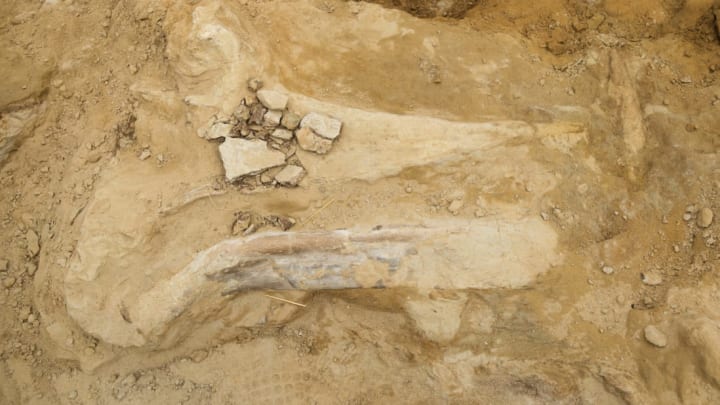Construction projects have yielded some pretty amazing ancient finds: ancient ports, Stone Age homes, forgotten cemeteries, burial grounds, and even the bones of King Richard III. Now, The Denver Post reports that workers in Thornton, Colorado, just north of Denver, recently discovered a 66-million-year-old adult triceratops skull, along with other bones, while breaking ground for the city's new public safety facility. It's an incredibly rare find as most of the fossils found in the region are about 12,000 years old.
Instead of digging on—which may have destroyed the skeleton—the workers contacted experts to take a closer look. Joe Sertich, curator of dinosaurs at the Denver Museum of Nature and Science, was called to the scene to examine the bones.
"This is what we as curators dream about—getting a call about a possible fossil and confirming it's not just a dinosaur fossil, but a record-breaking one!" Sertich said in a statement.

So far, scientists and volunteer diggers have unearthed the skull, two horns, a portion of the dinosaur's frill, shoulder bones, the beak at the front of the lower jaw, and ribs and vertebrae. The skeleton appears to be separated, indicating that the dinosaur may have died and lain on the ground for anywhere from a few days to a few weeks, according to The Washington Post. As it decayed, its bones and flesh fell apart, and other dinosaurs, like T. rex, may have even taken a nibble at the corpse.

Experts say the triceratops skeleton could be the most complete Cretaceous dinosaur ever discovered in the Front Range region, and one of the oldest fossils. They've also noted that the newly discovered dino fits a larger pattern: When found in the Denver area, triceratops are typically half the size of similar ones that once lived in the Dakotas and Montana.

"We don't really know why," Sertich said in a Facebook Live broadcast. "Even though we have hundreds of triceratops from the American West, we only have three good skulls. And this might be one of the best skeletons to tell us why Denver triceratops are smaller than all of their cousins everywhere else."
[h/t The Denver Post]
